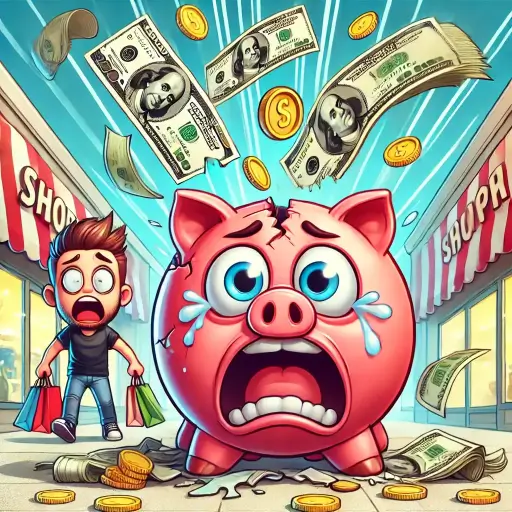"Pronunciation Made Perfect"
"Pronunciation Made Perfect"

[Some links on this site are affiliate links, meaning I may earn a commission if you make a purchase. This comes at no additional cost to you. Thank you for your support!]
Have you ever heard someone say, "I don’t want to break the bank"? This common idiom means spending so much money that it strains or exceeds your budget. When someone is afraid of breaking the bank, they’re worried about spending too much money, possibly to the point where they can't afford it. The idiom is used in both casual and professional conversations, especially when discussing costs, budgets, or financial decisions.
The origin of "break the bank" can be traced back to gambling. In old casinos, particularly in games like roulette, if a player won so much money that the casino couldn't pay out, they were said to have "broken the bank." Over time, this expression left the gambling world and entered everyday English. Now, it's used whenever someone spends a lot of money—more than they probably should.
For example, imagine planning a vacation. You could say, "I want to go to Hawaii, but I don’t want to break the bank." Here, you're expressing your desire to stay within a reasonable budget.
You might hear "break the bank" when talking about financial decisions. It’s especially useful when you want to emphasize spending a large amount of money. For instance, if you're buying a new phone, and it’s really expensive, you could say, "This phone might break the bank!"
This idiom is also great when discussing personal budgets or business expenses. In a work setting, if a company is planning a new project but wants to save money, they could say, "We need to find a solution that doesn’t break the bank." It's a casual way of talking about keeping costs low.
Let’s look at a sample dialogue:
Here, "Person B" is explaining that they don’t want to spend too much money on the new phone, showing how naturally this idiom fits into everyday money conversations.
Sometimes, idioms like "break the bank" sound more natural in conversation than formal language. For example, instead of saying, "I don’t want to spend too much money," you can simply say, "I don’t want to break the bank." While both sentences communicate the same idea, the idiom adds a more relaxed, conversational tone.
Let’s compare a few sentences:
As you can see, using idiomatic language helps create a friendlier tone. It’s less rigid than formal expressions and makes conversations feel more natural. Learning these differences will improve your ability to switch between formal and casual speech, depending on the situation.
Now that you know what "break the bank" means, it’s time to practice using it. Try incorporating this idiom into everyday conversations. Below are a few exercises to get you started.
Imagine you're shopping for a new car. You’ve found one you love, but it’s very expensive. Practice using "break the bank" to express your concern about the price.
Example dialogue:
Create five sentences using "break the bank" in different contexts. For example, you might talk about travel, gifts, home repairs, or a night out with friends. This will help reinforce your understanding of how the idiom can fit into various conversations.
Rewrite the following sentences using "break the bank" instead of formal language:
Practicing idiomatic expressions like "break the bank" will boost your confidence when speaking English in casual and formal settings. The more you use it, the more natural it will feel!
Using "break the bank" is a fun and easy way to sound more like a native English speaker. Whether you’re talking about personal expenses, business costs, or budgeting for something special, this idiom helps make your language colorful and engaging. Remember, don’t let your learning process break the bank either—keep practicing, and you’ll see your skills improve every day!
Ready to take your English to the next level?
Thank you for trusting Mr. Practical English as your partner in language learning. Together, we'll make your journey enjoyable and successful!